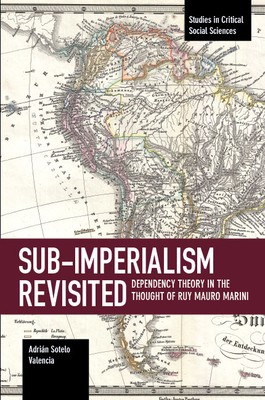
- We will send in 10–14 business days.
- Author: Adrián Sotelo Valencia
- Publisher: Haymarket Books
- ISBN-10: 1608469344
- ISBN-13: 9781608469345
- Format: 15.2 x 22.9 x 1 cm, softcover
- Language: English
- SAVE -10% with code: EXTRA
Reviews
Description
One of the central claims of dependency theory--the nearly dominate framework adopted by the entire discipline of development studies since the 1960s--was that the yoke of imperial powers, especially the United States, weighed so heavily as to preclude the possibility of nations in the Third World becoming peer competitors on the global market. But what does the growing economic might of regional superpowers like Brazil mean for these views?
In this theoretically rigorous study by the brilliant Mexican analyst Adrian Sotelo Valencia these and other enigmas of development are answered through an examination of conditions in 21st Century Latin America. Using the concept of 'sub-imperialism' as advanced in the pioneering work of Ruy Mauro Marini, Sotelo elucidates the explanatory power of a fully Marxist conception of imperialism and underdevelopment while providing considerable insight into other views of dependency. This timely and insightful book enables readers to appreciate why radical dependency theory remains more relevant today than ever.
EXTRA 10 % discount with code: EXTRA
The promotion ends in 20d.05:40:01
The discount code is valid when purchasing from 10 €. Discounts do not stack.
- Author: Adrián Sotelo Valencia
- Publisher: Haymarket Books
- ISBN-10: 1608469344
- ISBN-13: 9781608469345
- Format: 15.2 x 22.9 x 1 cm, softcover
- Language: English English
One of the central claims of dependency theory--the nearly dominate framework adopted by the entire discipline of development studies since the 1960s--was that the yoke of imperial powers, especially the United States, weighed so heavily as to preclude the possibility of nations in the Third World becoming peer competitors on the global market. But what does the growing economic might of regional superpowers like Brazil mean for these views?
In this theoretically rigorous study by the brilliant Mexican analyst Adrian Sotelo Valencia these and other enigmas of development are answered through an examination of conditions in 21st Century Latin America. Using the concept of 'sub-imperialism' as advanced in the pioneering work of Ruy Mauro Marini, Sotelo elucidates the explanatory power of a fully Marxist conception of imperialism and underdevelopment while providing considerable insight into other views of dependency. This timely and insightful book enables readers to appreciate why radical dependency theory remains more relevant today than ever.


Reviews